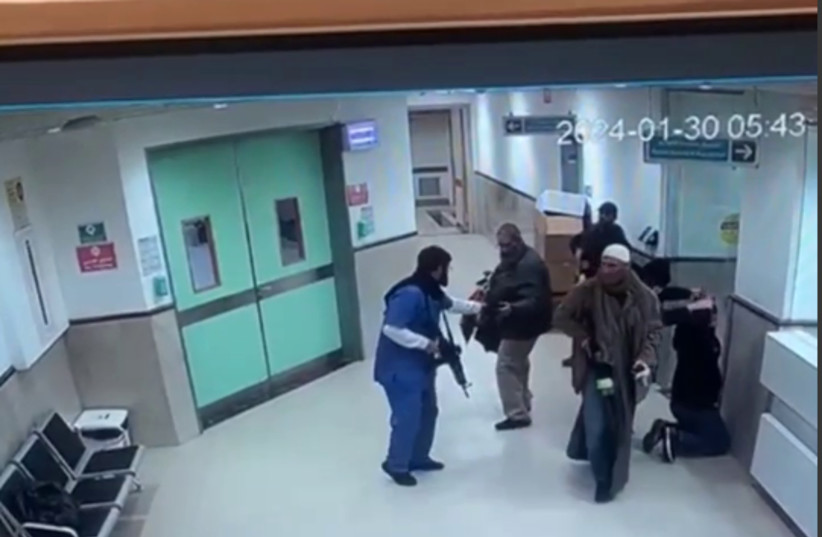Ex-senior Shin Bet official tells how undercover hospital raids are done
In his 27 years in the Shin Bet security agency, former division head Shalom Ben Hanan has seen it all, including past raids of hospitals to arrest wounded terrorists.
Still, Ben Hanan told The Jerusalem Post on Tuesday that he was impressed by his agency’s (he retired in 2022) creativity and audacity with the operation in a Jenin hospital against a terrorist cell that was planning an invasion of a Jewish village for a mass casualty attack.
He said that there were operations he worked on in hospitals over the years, both during the Second Intifada and also after, but it was not this kind of a targeted killing operation to thwart a terrorist cell like what happened here.
“Here, they were very deep into planning a mega terrorist attack which would kill massive numbers of people,” said the former senior Shin Bet official, who retired with the equivalent rank of a major-general in charge of a whole division of the IDF.

In this case, Ben Hanan said, “There was a special level of urgency, because it [the terrorist attack] was on the verge of being carried out – this made the situation exceptional.”
“A hospital is a very hard area to maneuver in. You need intelligence that allows you to strike the target without hitting innocent persons. You can’t just fire a missile, not even a precision one which might just hit his room,” he said, because the risk and consequences of missing are too grave.
Ben Hanan said that such an operation can be split into the intelligence gathering stage and the operations stage.
Intelligence vs. Operations stage
The intelligence collection stage itself can also be divided into separate components: intelligence mapping out the threat and intelligence for the operation that will remove the threat.
He explained that it was crucial to “obtain the most precise and intimate intelligence regarding the details and infrastructure, which are the backbone of the terrorist threat.
“This can help lead to an actual operation. If someone is on the verge of invading a village to perpetrate a mass killing, and you know about it, you know how they connect to foreign commanders, you know they have money, you know they have tried to commit terrorism before and were wounded in the process,” then top decision-makers can cut through the red tape and order an immediate operation, he said.
Ben Hanan emphasized how important the quality of the intelligence about the immediacy of the threat is, since a targeted killing operation like the one ordered on Tuesday requires re-purposing resources from other potential threats.
Next, there is the intelligence for carrying out the operation itself.
“You need precise intelligence of what is going on inside the hospital. You do not want to send your elite forces to travel through the whole hospital,” which would leave them exposed for longer.
Also, “You do not want to have to close the whole thing down and send patients outside and risk hostages being taken. You want a narrow and targeted operation where your forces get quickly to the specific room for surgically removing the threat.”
He said that to carry out an operation like Israel pulled off on Tuesday, which “had no collateral damage, no harm to patients, medical staff, nor to any innocents – was a high aspirational standard.”
Moving on to the operational components themselves, Ben Hanan said that you need “a very high planning capability, an understanding that time is short and that you don’t want to risk enough time passing such that the target might move to another room or leave the hospital. You need hot, real-time intelligence.”
Next, he said, “Significant operational talent is required to arrive in enemy territory and even to get into the hospital without your cover being blown. You need to dress up, fade into the atmosphere and have high-level Arabic speakers so that until the moment where they take out their weapons, no one knows they are there to attack. They need to think that the attackers are locals.”
In addition, he said, even the exit strategy must be very carefully planned and executed. In the current context of high tension, any exit from such West Bank areas almost automatically invites significant amounts of gunfire, improvised explosive devices, and other threats.
Escaping through that maelstrom without losing any Israeli agents requires perfect execution.
Finally, Ben Hanan said that the operation was a powerful message to all Palestinian terrorists in both the West Bank and Gaza that there is no civilian location that they can abuse with impunity.
He said that in the past hospitals were more out of the question for operations like this, but that with terrorists not going to hospitals merely when they are wounded, but also using them on purpose to perpetrate terrorist planning and logistics organization, Israel can no longer hold back.
However, he added that, as long as the Shin Bet succeeds with surgical operations that only kill the terrorists, and do not harm any nearby innocents, such operations can continue and do not provide global critics any basis to condemn Israel.





Comments are closed.